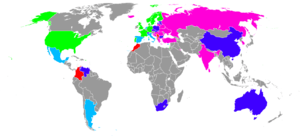Hague Evidence Convention
| Convention on the Taking of Evidence Abroad in Civil or Commercial Matters | |
|---|---|
|
States parties to the convention by year of ratifications: green: '70, light blue: '80, blue '90, pink '00, red '10 | |
| Signed | 18 March 1970 |
| Location | The Netherlands |
| Effective | 7 October 1972 |
| Condition | ratification by 3 states[1] |
| Parties | 59 |
| Depositary | Ministry of Foreign Affairs (Netherlands) |
| Languages | French and English |
|
| |
The Convention on the Taking of Evidence Abroad in Civil or Commercial Matters—more commonly referred to as the Hague Evidence Convention—is a multilateral treaty which was drafted under the auspices of the Hague Conference on Private International Law (HCPIL). The treaty was negotiated in 1967 and 1968 and signed in The Hague on 18 March 1970. It entered into force in 1972. It allows transmission of letters of request (letters rogatory) from one signatory state (where the evidence is sought) to another signatory state (where the evidence is located) without recourse to consular and diplomatic channels.[2] Inside the US, obtaining evidence under the Evidence Convention can be compared to comity.[3]
The Hague Evidence Convention was not the first convention to address the transmission of evidence from one state to another. The 1905 Civil Procedure Convention—also signed in The Hague—contained provisions dealing with the transmission of evidence. However, that earlier convention did not command wide support and was only ratified by 22 countries. The United States initiated the negotiations that led to the creation of the Hague Evidence Convention. However, insofar as requests to United States courts are concerned, parties may also use the simpler discovery provision codified at 28 U.S.C. § 1782 (see Section 1782 Discovery).
Between states of the European Union, the Hague Evidence Convention has largely been supplanted by Council Regulation (EC) No. 1206/2001 on Cooperation Between the Courts of the Member States in the Taking of Evidence in Civil or Commercial Matters.
Parties to the Hague Evidence Convention
 |
As of 2016, there are 59 states which are parties of the Hague Evidence Convention. Fifty-four of the HCPIL member states are party to the Hague Evidence Convention. In addition, five states that are not members of the HCPIL (Barbados, Colombia, Kuwait, Liechtenstein, and Seychelles) have joined the Hague Evidence Convention. Article 39 of the Hague Evidence Convention expressly permits states which are not members of the HCPIL to accede to the Convention.
|
|
References
- ↑ "20: Convention of 18 March 1970 on the Taking of Evidence Abroad in Civil or Commercial Matters". Hague Conference on Private International Law. Retrieved 13 January 2012.
- ↑ http://www.law.unc.edu/journals/ncilj/issues/volume40/issue-3-spring-2015/the-hague-convention-a-medium-for-international-discovery/ Retrieved 15 February 2015.
- ↑ http://papers.ssrn.com/sol3/papers.cfm?abstract_id=2564797
